Case Study Analysis: Matthew's Bowel Cancer Treatment
VerifiedAdded on 2022/10/02
|6
|1497
|31
Case Study
AI Summary
This case study focuses on Matthew, a patient diagnosed with bowel cancer, detailing his diagnosis, the psychological impact on him and his family, and the importance of effective communication and support from healthcare providers. It outlines the need for holistic care, emphasizing the role of nurses in providing patient-centered care. The analysis includes post-operative intervention strategies involving a multidisciplinary team, including specialists in intensive care, nephrology, genetics, and nutrition. The study describes the tests performed, medications given (including Capecitabine), and recommended medical procedures. It also covers the importance of ongoing monitoring, potential side effects, and the need for a nutritious diet. References from various medical journals and publications are included to support the analysis. The study underscores the complexity of cancer care and the need for a comprehensive approach to patient management.

Running head: CASE STUDY ANALYSIS
CASE STUDY ANALYSIS
Name of the student
Name of the university
Author’s name
CASE STUDY ANALYSIS
Name of the student
Name of the university
Author’s name
Paraphrase This Document
Need a fresh take? Get an instant paraphrase of this document with our AI Paraphraser
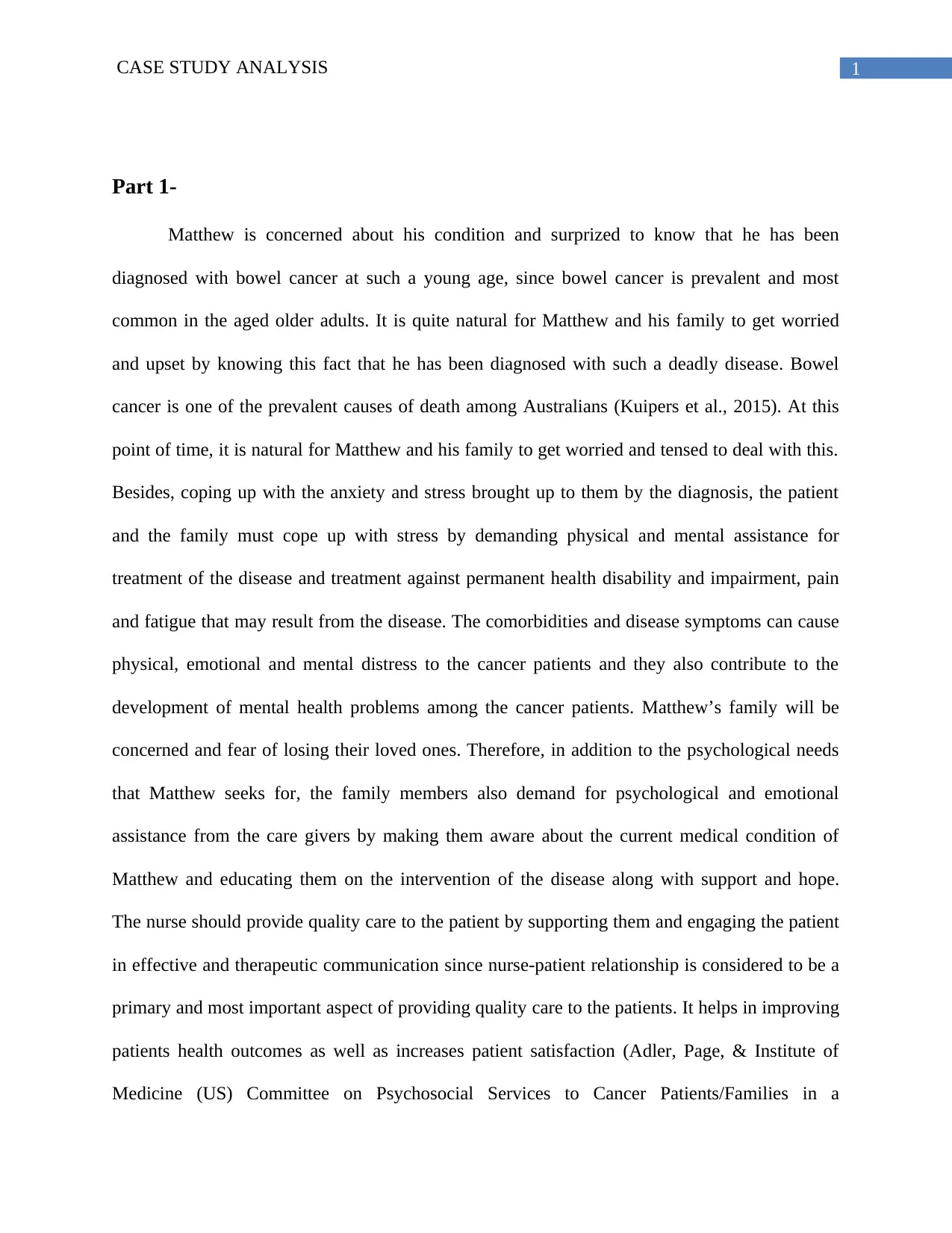
1CASE STUDY ANALYSIS
Part 1-
Matthew is concerned about his condition and surprized to know that he has been
diagnosed with bowel cancer at such a young age, since bowel cancer is prevalent and most
common in the aged older adults. It is quite natural for Matthew and his family to get worried
and upset by knowing this fact that he has been diagnosed with such a deadly disease. Bowel
cancer is one of the prevalent causes of death among Australians (Kuipers et al., 2015). At this
point of time, it is natural for Matthew and his family to get worried and tensed to deal with this.
Besides, coping up with the anxiety and stress brought up to them by the diagnosis, the patient
and the family must cope up with stress by demanding physical and mental assistance for
treatment of the disease and treatment against permanent health disability and impairment, pain
and fatigue that may result from the disease. The comorbidities and disease symptoms can cause
physical, emotional and mental distress to the cancer patients and they also contribute to the
development of mental health problems among the cancer patients. Matthew’s family will be
concerned and fear of losing their loved ones. Therefore, in addition to the psychological needs
that Matthew seeks for, the family members also demand for psychological and emotional
assistance from the care givers by making them aware about the current medical condition of
Matthew and educating them on the intervention of the disease along with support and hope.
The nurse should provide quality care to the patient by supporting them and engaging the patient
in effective and therapeutic communication since nurse-patient relationship is considered to be a
primary and most important aspect of providing quality care to the patients. It helps in improving
patients health outcomes as well as increases patient satisfaction (Adler, Page, & Institute of
Medicine (US) Committee on Psychosocial Services to Cancer Patients/Families in a
Part 1-
Matthew is concerned about his condition and surprized to know that he has been
diagnosed with bowel cancer at such a young age, since bowel cancer is prevalent and most
common in the aged older adults. It is quite natural for Matthew and his family to get worried
and upset by knowing this fact that he has been diagnosed with such a deadly disease. Bowel
cancer is one of the prevalent causes of death among Australians (Kuipers et al., 2015). At this
point of time, it is natural for Matthew and his family to get worried and tensed to deal with this.
Besides, coping up with the anxiety and stress brought up to them by the diagnosis, the patient
and the family must cope up with stress by demanding physical and mental assistance for
treatment of the disease and treatment against permanent health disability and impairment, pain
and fatigue that may result from the disease. The comorbidities and disease symptoms can cause
physical, emotional and mental distress to the cancer patients and they also contribute to the
development of mental health problems among the cancer patients. Matthew’s family will be
concerned and fear of losing their loved ones. Therefore, in addition to the psychological needs
that Matthew seeks for, the family members also demand for psychological and emotional
assistance from the care givers by making them aware about the current medical condition of
Matthew and educating them on the intervention of the disease along with support and hope.
The nurse should provide quality care to the patient by supporting them and engaging the patient
in effective and therapeutic communication since nurse-patient relationship is considered to be a
primary and most important aspect of providing quality care to the patients. It helps in improving
patients health outcomes as well as increases patient satisfaction (Adler, Page, & Institute of
Medicine (US) Committee on Psychosocial Services to Cancer Patients/Families in a
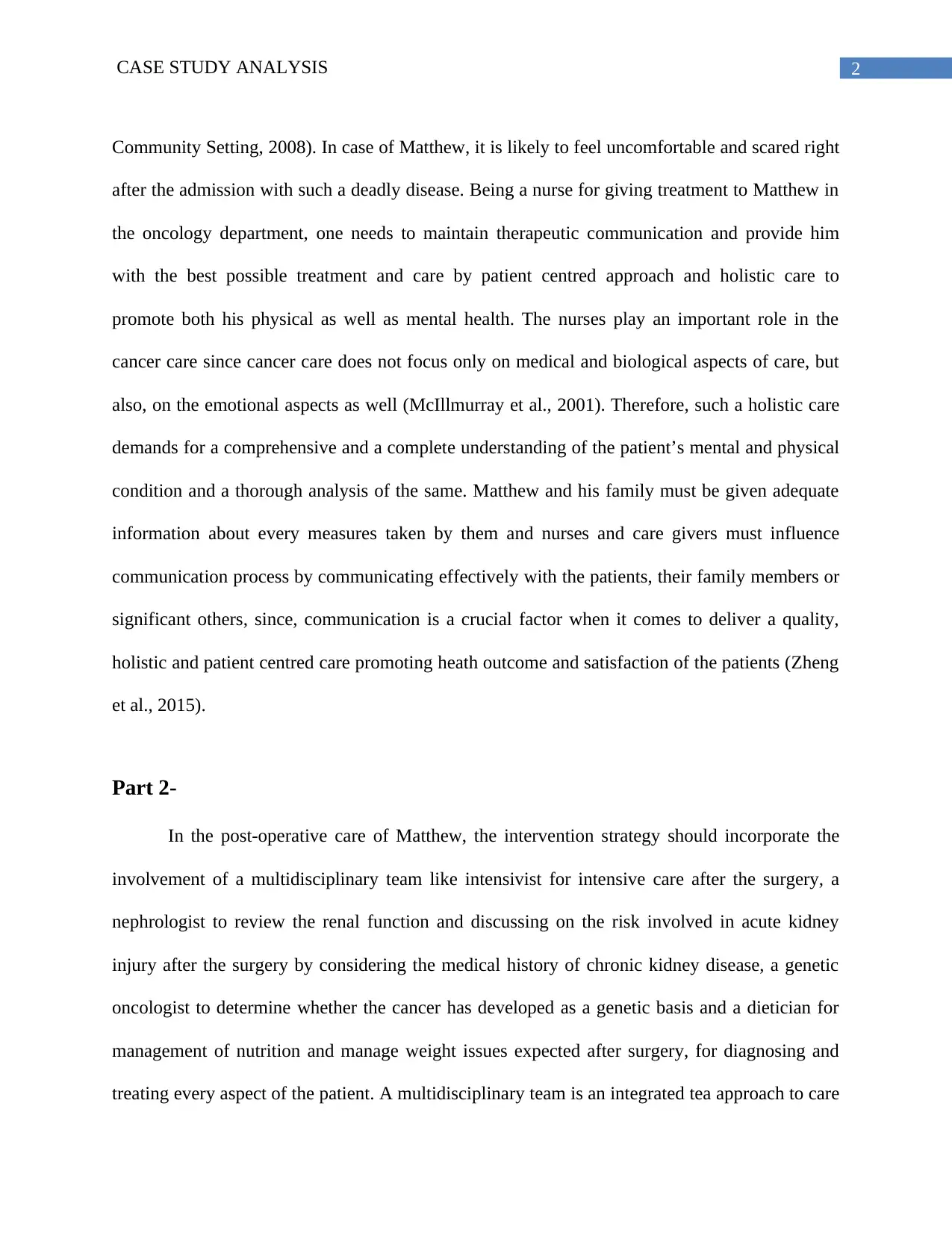
2CASE STUDY ANALYSIS
Community Setting, 2008). In case of Matthew, it is likely to feel uncomfortable and scared right
after the admission with such a deadly disease. Being a nurse for giving treatment to Matthew in
the oncology department, one needs to maintain therapeutic communication and provide him
with the best possible treatment and care by patient centred approach and holistic care to
promote both his physical as well as mental health. The nurses play an important role in the
cancer care since cancer care does not focus only on medical and biological aspects of care, but
also, on the emotional aspects as well (McIllmurray et al., 2001). Therefore, such a holistic care
demands for a comprehensive and a complete understanding of the patient’s mental and physical
condition and a thorough analysis of the same. Matthew and his family must be given adequate
information about every measures taken by them and nurses and care givers must influence
communication process by communicating effectively with the patients, their family members or
significant others, since, communication is a crucial factor when it comes to deliver a quality,
holistic and patient centred care promoting heath outcome and satisfaction of the patients (Zheng
et al., 2015).
Part 2-
In the post-operative care of Matthew, the intervention strategy should incorporate the
involvement of a multidisciplinary team like intensivist for intensive care after the surgery, a
nephrologist to review the renal function and discussing on the risk involved in acute kidney
injury after the surgery by considering the medical history of chronic kidney disease, a genetic
oncologist to determine whether the cancer has developed as a genetic basis and a dietician for
management of nutrition and manage weight issues expected after surgery, for diagnosing and
treating every aspect of the patient. A multidisciplinary team is an integrated tea approach to care
Community Setting, 2008). In case of Matthew, it is likely to feel uncomfortable and scared right
after the admission with such a deadly disease. Being a nurse for giving treatment to Matthew in
the oncology department, one needs to maintain therapeutic communication and provide him
with the best possible treatment and care by patient centred approach and holistic care to
promote both his physical as well as mental health. The nurses play an important role in the
cancer care since cancer care does not focus only on medical and biological aspects of care, but
also, on the emotional aspects as well (McIllmurray et al., 2001). Therefore, such a holistic care
demands for a comprehensive and a complete understanding of the patient’s mental and physical
condition and a thorough analysis of the same. Matthew and his family must be given adequate
information about every measures taken by them and nurses and care givers must influence
communication process by communicating effectively with the patients, their family members or
significant others, since, communication is a crucial factor when it comes to deliver a quality,
holistic and patient centred care promoting heath outcome and satisfaction of the patients (Zheng
et al., 2015).
Part 2-
In the post-operative care of Matthew, the intervention strategy should incorporate the
involvement of a multidisciplinary team like intensivist for intensive care after the surgery, a
nephrologist to review the renal function and discussing on the risk involved in acute kidney
injury after the surgery by considering the medical history of chronic kidney disease, a genetic
oncologist to determine whether the cancer has developed as a genetic basis and a dietician for
management of nutrition and manage weight issues expected after surgery, for diagnosing and
treating every aspect of the patient. A multidisciplinary team is an integrated tea approach to care
⊘ This is a preview!⊘
Do you want full access?
Subscribe today to unlock all pages.

Trusted by 1+ million students worldwide
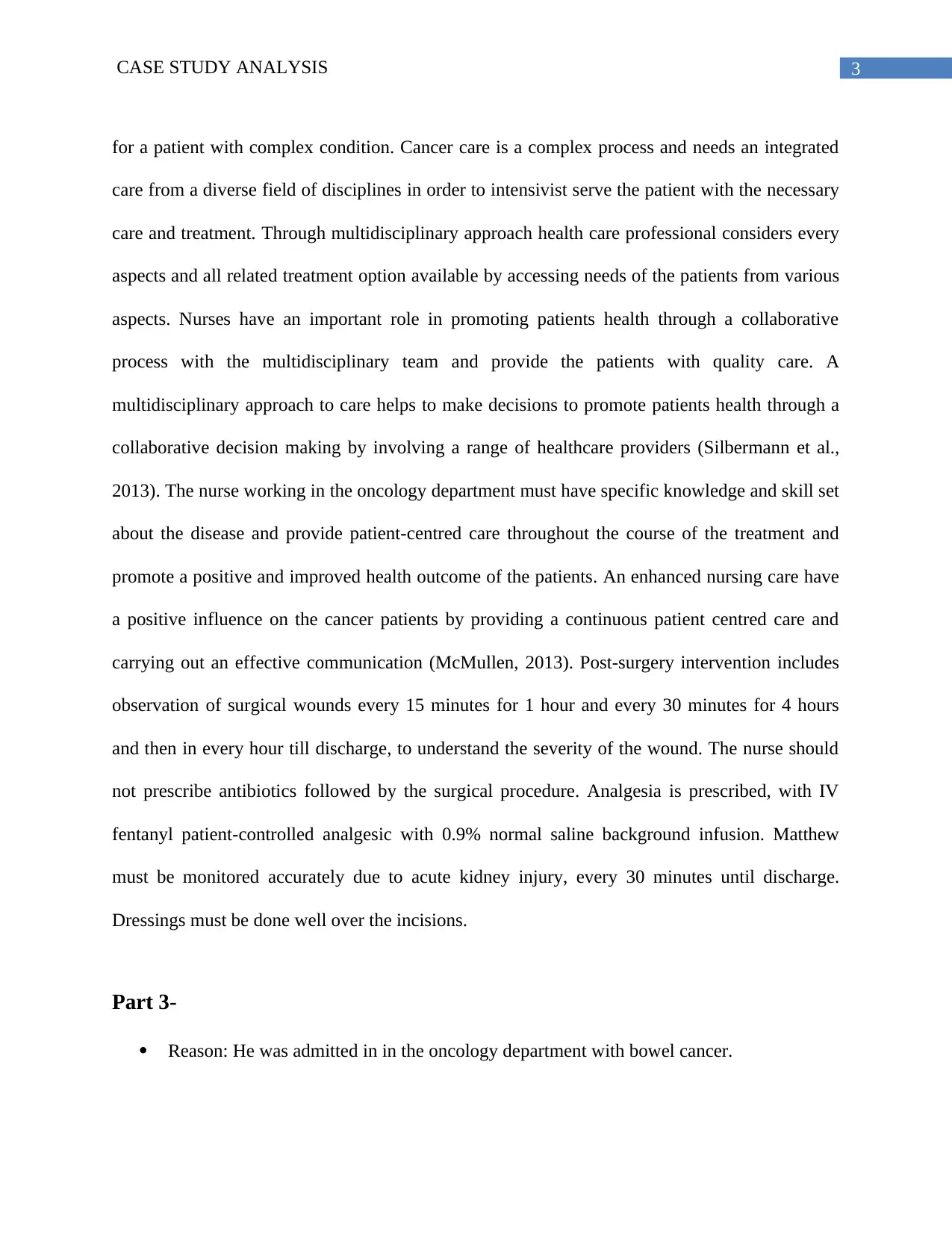
3CASE STUDY ANALYSIS
for a patient with complex condition. Cancer care is a complex process and needs an integrated
care from a diverse field of disciplines in order to intensivist serve the patient with the necessary
care and treatment. Through multidisciplinary approach health care professional considers every
aspects and all related treatment option available by accessing needs of the patients from various
aspects. Nurses have an important role in promoting patients health through a collaborative
process with the multidisciplinary team and provide the patients with quality care. A
multidisciplinary approach to care helps to make decisions to promote patients health through a
collaborative decision making by involving a range of healthcare providers (Silbermann et al.,
2013). The nurse working in the oncology department must have specific knowledge and skill set
about the disease and provide patient-centred care throughout the course of the treatment and
promote a positive and improved health outcome of the patients. An enhanced nursing care have
a positive influence on the cancer patients by providing a continuous patient centred care and
carrying out an effective communication (McMullen, 2013). Post-surgery intervention includes
observation of surgical wounds every 15 minutes for 1 hour and every 30 minutes for 4 hours
and then in every hour till discharge, to understand the severity of the wound. The nurse should
not prescribe antibiotics followed by the surgical procedure. Analgesia is prescribed, with IV
fentanyl patient-controlled analgesic with 0.9% normal saline background infusion. Matthew
must be monitored accurately due to acute kidney injury, every 30 minutes until discharge.
Dressings must be done well over the incisions.
Part 3-
Reason: He was admitted in in the oncology department with bowel cancer.
for a patient with complex condition. Cancer care is a complex process and needs an integrated
care from a diverse field of disciplines in order to intensivist serve the patient with the necessary
care and treatment. Through multidisciplinary approach health care professional considers every
aspects and all related treatment option available by accessing needs of the patients from various
aspects. Nurses have an important role in promoting patients health through a collaborative
process with the multidisciplinary team and provide the patients with quality care. A
multidisciplinary approach to care helps to make decisions to promote patients health through a
collaborative decision making by involving a range of healthcare providers (Silbermann et al.,
2013). The nurse working in the oncology department must have specific knowledge and skill set
about the disease and provide patient-centred care throughout the course of the treatment and
promote a positive and improved health outcome of the patients. An enhanced nursing care have
a positive influence on the cancer patients by providing a continuous patient centred care and
carrying out an effective communication (McMullen, 2013). Post-surgery intervention includes
observation of surgical wounds every 15 minutes for 1 hour and every 30 minutes for 4 hours
and then in every hour till discharge, to understand the severity of the wound. The nurse should
not prescribe antibiotics followed by the surgical procedure. Analgesia is prescribed, with IV
fentanyl patient-controlled analgesic with 0.9% normal saline background infusion. Matthew
must be monitored accurately due to acute kidney injury, every 30 minutes until discharge.
Dressings must be done well over the incisions.
Part 3-
Reason: He was admitted in in the oncology department with bowel cancer.
Paraphrase This Document
Need a fresh take? Get an instant paraphrase of this document with our AI Paraphraser
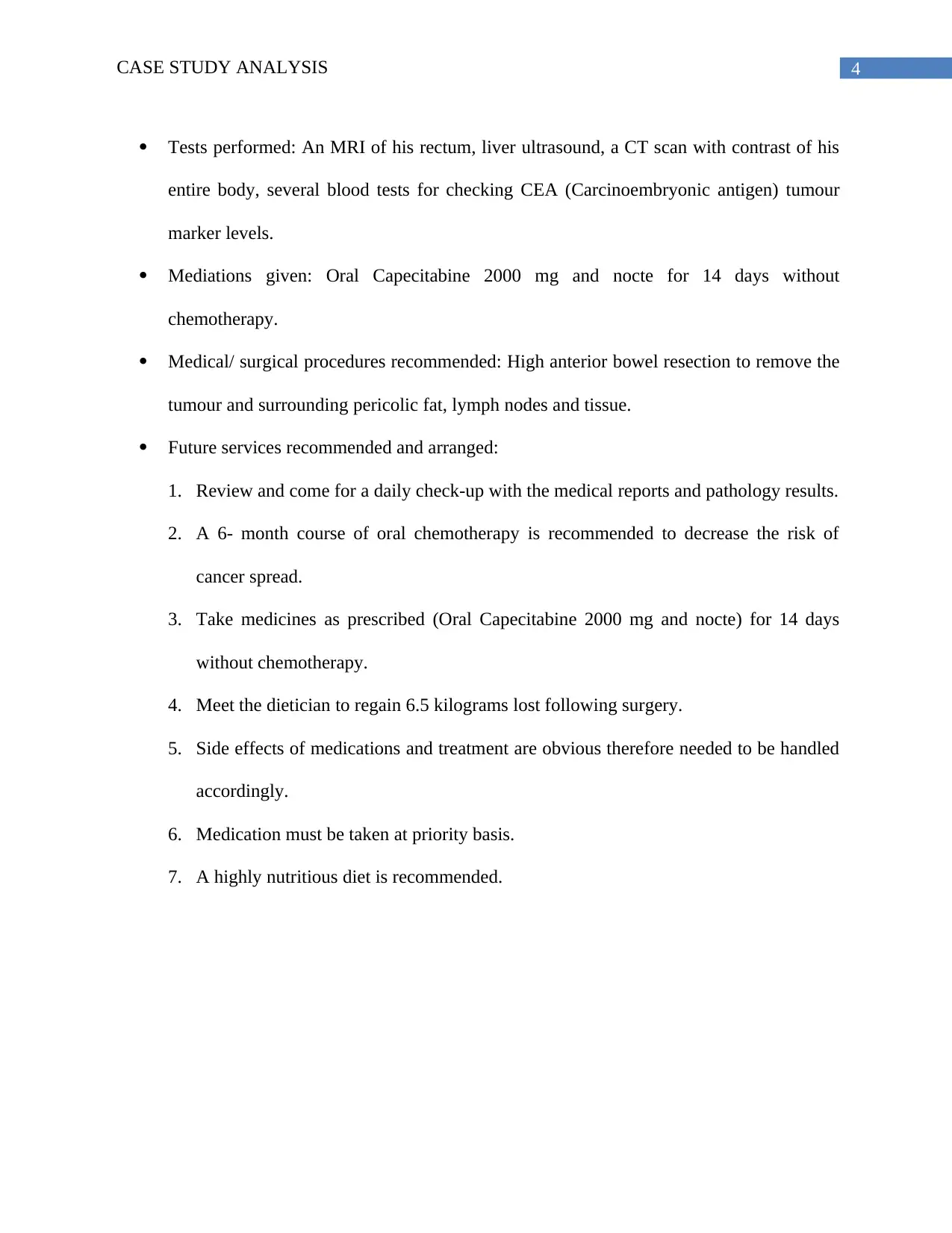
4CASE STUDY ANALYSIS
Tests performed: An MRI of his rectum, liver ultrasound, a CT scan with contrast of his
entire body, several blood tests for checking CEA (Carcinoembryonic antigen) tumour
marker levels.
Mediations given: Oral Capecitabine 2000 mg and nocte for 14 days without
chemotherapy.
Medical/ surgical procedures recommended: High anterior bowel resection to remove the
tumour and surrounding pericolic fat, lymph nodes and tissue.
Future services recommended and arranged:
1. Review and come for a daily check-up with the medical reports and pathology results.
2. A 6- month course of oral chemotherapy is recommended to decrease the risk of
cancer spread.
3. Take medicines as prescribed (Oral Capecitabine 2000 mg and nocte) for 14 days
without chemotherapy.
4. Meet the dietician to regain 6.5 kilograms lost following surgery.
5. Side effects of medications and treatment are obvious therefore needed to be handled
accordingly.
6. Medication must be taken at priority basis.
7. A highly nutritious diet is recommended.
Tests performed: An MRI of his rectum, liver ultrasound, a CT scan with contrast of his
entire body, several blood tests for checking CEA (Carcinoembryonic antigen) tumour
marker levels.
Mediations given: Oral Capecitabine 2000 mg and nocte for 14 days without
chemotherapy.
Medical/ surgical procedures recommended: High anterior bowel resection to remove the
tumour and surrounding pericolic fat, lymph nodes and tissue.
Future services recommended and arranged:
1. Review and come for a daily check-up with the medical reports and pathology results.
2. A 6- month course of oral chemotherapy is recommended to decrease the risk of
cancer spread.
3. Take medicines as prescribed (Oral Capecitabine 2000 mg and nocte) for 14 days
without chemotherapy.
4. Meet the dietician to regain 6.5 kilograms lost following surgery.
5. Side effects of medications and treatment are obvious therefore needed to be handled
accordingly.
6. Medication must be taken at priority basis.
7. A highly nutritious diet is recommended.
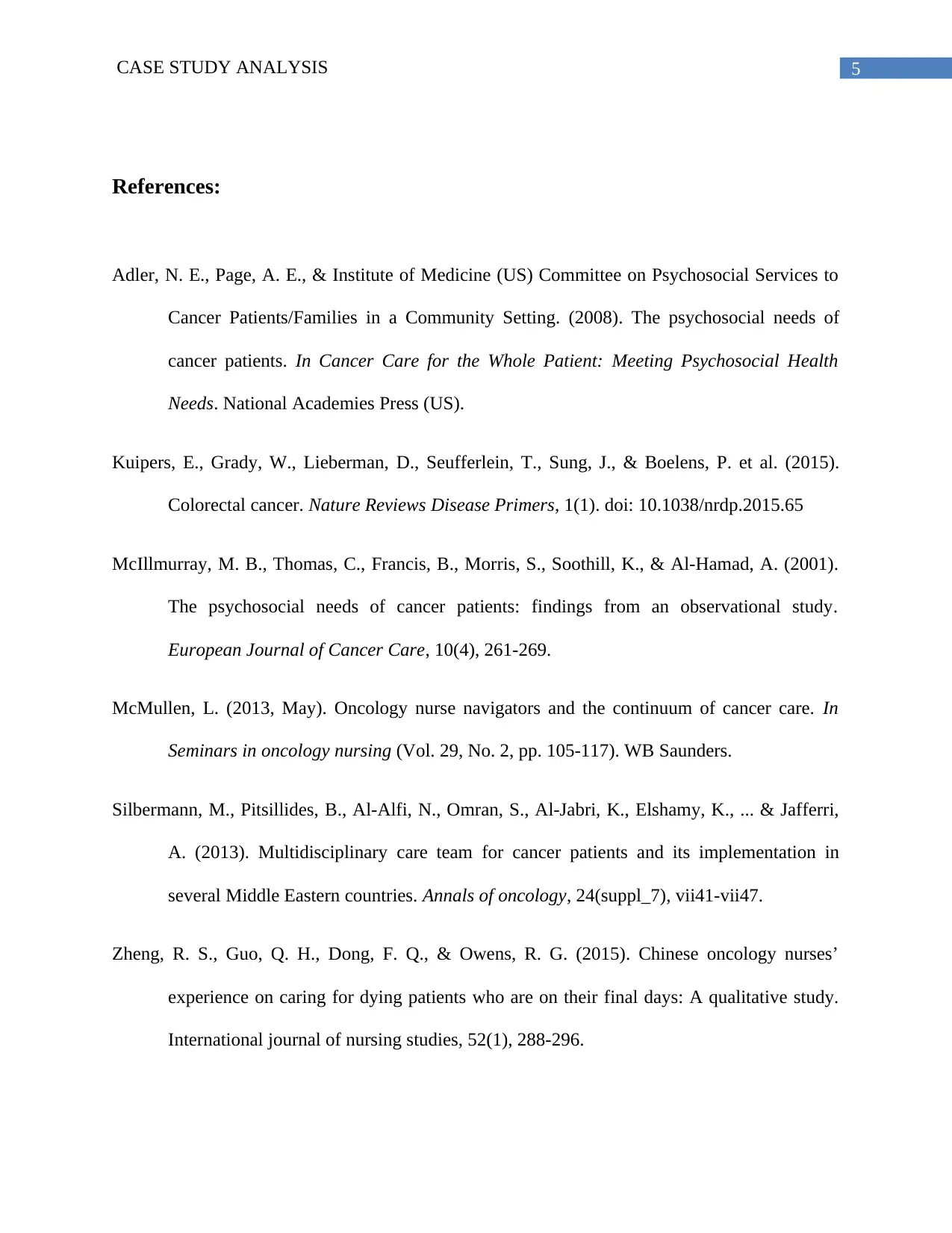
5CASE STUDY ANALYSIS
References:
Adler, N. E., Page, A. E., & Institute of Medicine (US) Committee on Psychosocial Services to
Cancer Patients/Families in a Community Setting. (2008). The psychosocial needs of
cancer patients. In Cancer Care for the Whole Patient: Meeting Psychosocial Health
Needs. National Academies Press (US).
Kuipers, E., Grady, W., Lieberman, D., Seufferlein, T., Sung, J., & Boelens, P. et al. (2015).
Colorectal cancer. Nature Reviews Disease Primers, 1(1). doi: 10.1038/nrdp.2015.65
McIllmurray, M. B., Thomas, C., Francis, B., Morris, S., Soothill, K., & Al‐Hamad, A. (2001).
The psychosocial needs of cancer patients: findings from an observational study.
European Journal of Cancer Care, 10(4), 261-269.
McMullen, L. (2013, May). Oncology nurse navigators and the continuum of cancer care. In
Seminars in oncology nursing (Vol. 29, No. 2, pp. 105-117). WB Saunders.
Silbermann, M., Pitsillides, B., Al-Alfi, N., Omran, S., Al-Jabri, K., Elshamy, K., ... & Jafferri,
A. (2013). Multidisciplinary care team for cancer patients and its implementation in
several Middle Eastern countries. Annals of oncology, 24(suppl_7), vii41-vii47.
Zheng, R. S., Guo, Q. H., Dong, F. Q., & Owens, R. G. (2015). Chinese oncology nurses’
experience on caring for dying patients who are on their final days: A qualitative study.
International journal of nursing studies, 52(1), 288-296.
References:
Adler, N. E., Page, A. E., & Institute of Medicine (US) Committee on Psychosocial Services to
Cancer Patients/Families in a Community Setting. (2008). The psychosocial needs of
cancer patients. In Cancer Care for the Whole Patient: Meeting Psychosocial Health
Needs. National Academies Press (US).
Kuipers, E., Grady, W., Lieberman, D., Seufferlein, T., Sung, J., & Boelens, P. et al. (2015).
Colorectal cancer. Nature Reviews Disease Primers, 1(1). doi: 10.1038/nrdp.2015.65
McIllmurray, M. B., Thomas, C., Francis, B., Morris, S., Soothill, K., & Al‐Hamad, A. (2001).
The psychosocial needs of cancer patients: findings from an observational study.
European Journal of Cancer Care, 10(4), 261-269.
McMullen, L. (2013, May). Oncology nurse navigators and the continuum of cancer care. In
Seminars in oncology nursing (Vol. 29, No. 2, pp. 105-117). WB Saunders.
Silbermann, M., Pitsillides, B., Al-Alfi, N., Omran, S., Al-Jabri, K., Elshamy, K., ... & Jafferri,
A. (2013). Multidisciplinary care team for cancer patients and its implementation in
several Middle Eastern countries. Annals of oncology, 24(suppl_7), vii41-vii47.
Zheng, R. S., Guo, Q. H., Dong, F. Q., & Owens, R. G. (2015). Chinese oncology nurses’
experience on caring for dying patients who are on their final days: A qualitative study.
International journal of nursing studies, 52(1), 288-296.
⊘ This is a preview!⊘
Do you want full access?
Subscribe today to unlock all pages.

Trusted by 1+ million students worldwide
1 out of 6
Related Documents
Your All-in-One AI-Powered Toolkit for Academic Success.
+13062052269
info@desklib.com
Available 24*7 on WhatsApp / Email
![[object Object]](/_next/static/media/star-bottom.7253800d.svg)
Unlock your academic potential
Copyright © 2020–2026 A2Z Services. All Rights Reserved. Developed and managed by ZUCOL.





